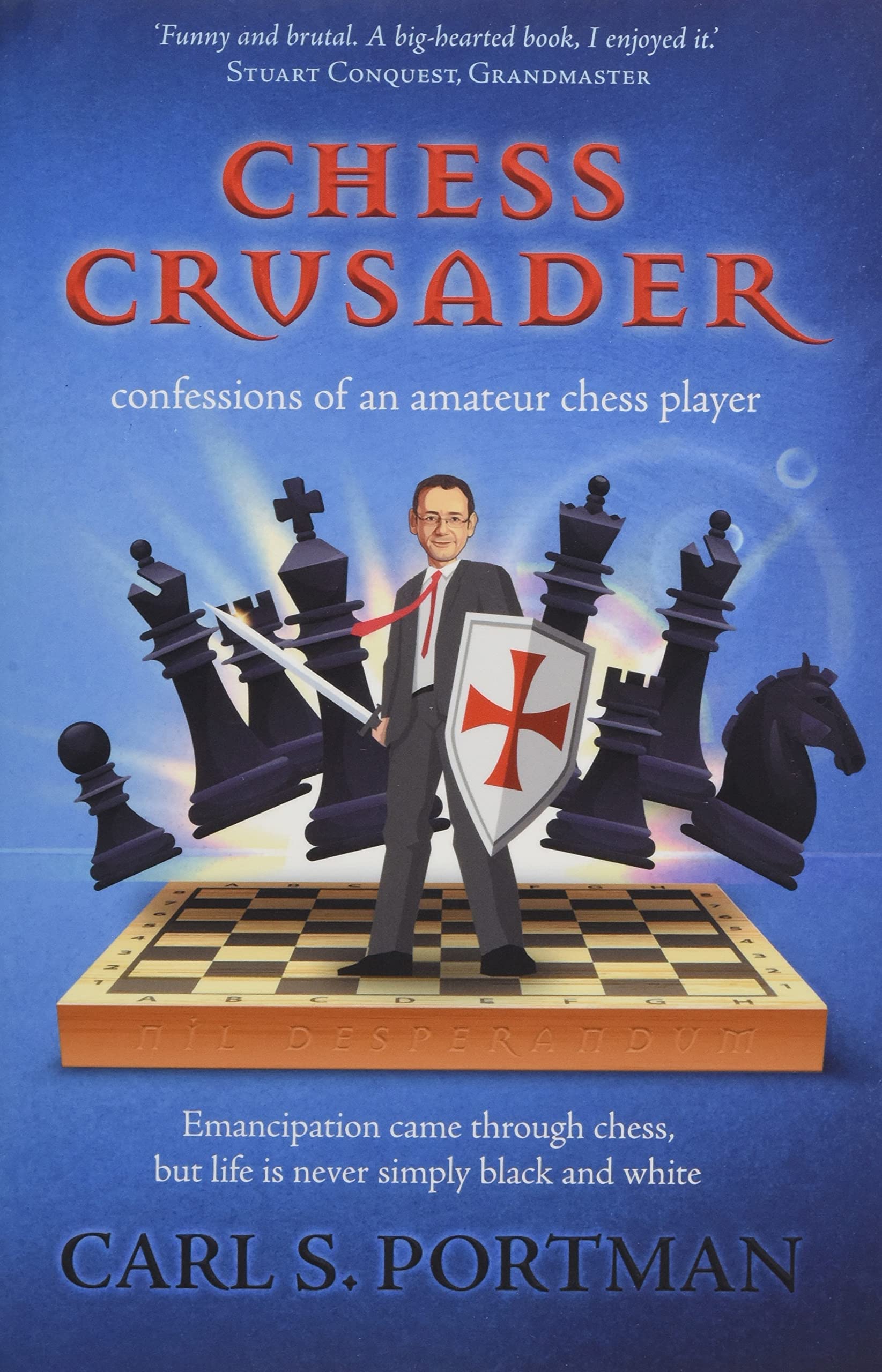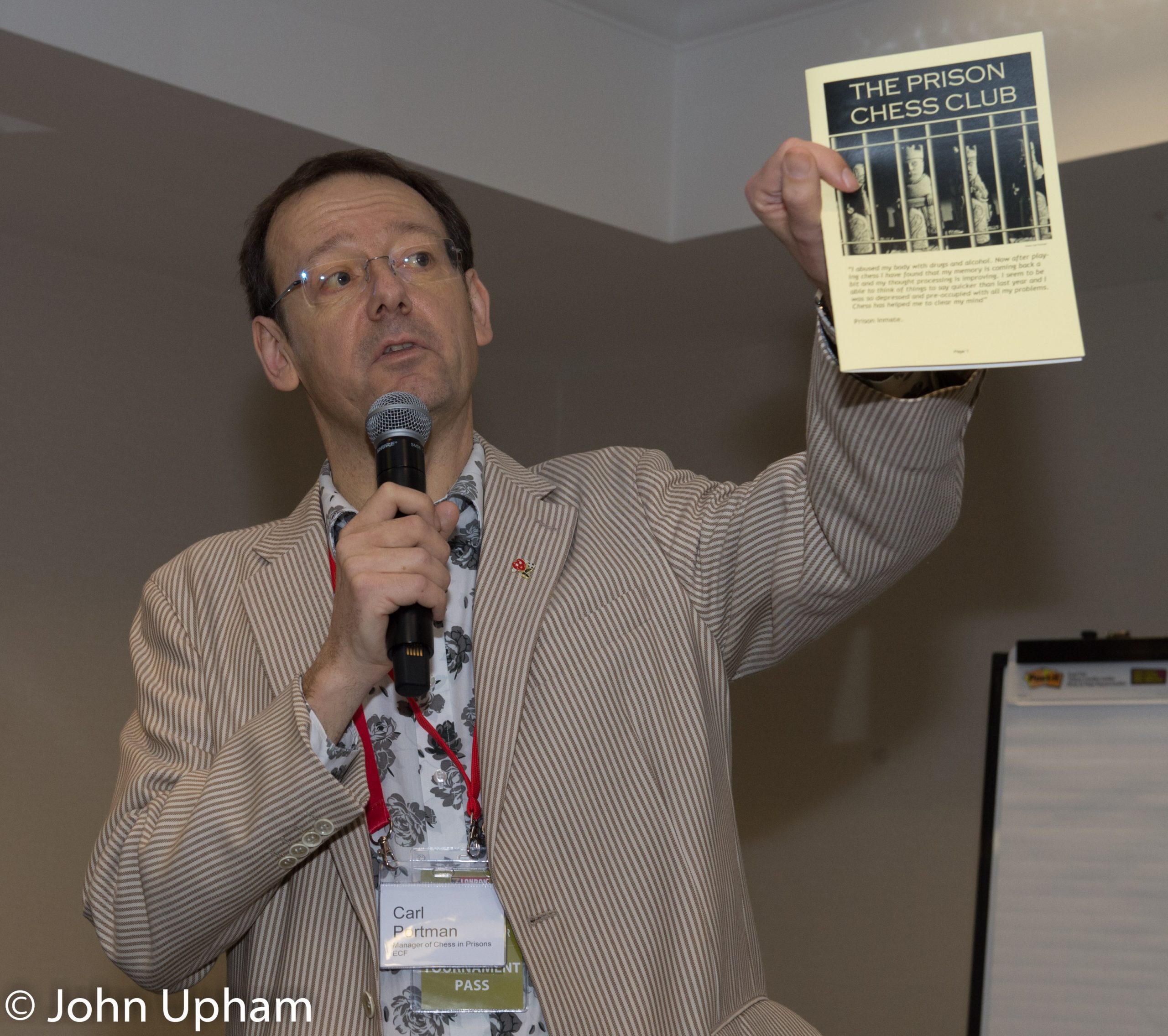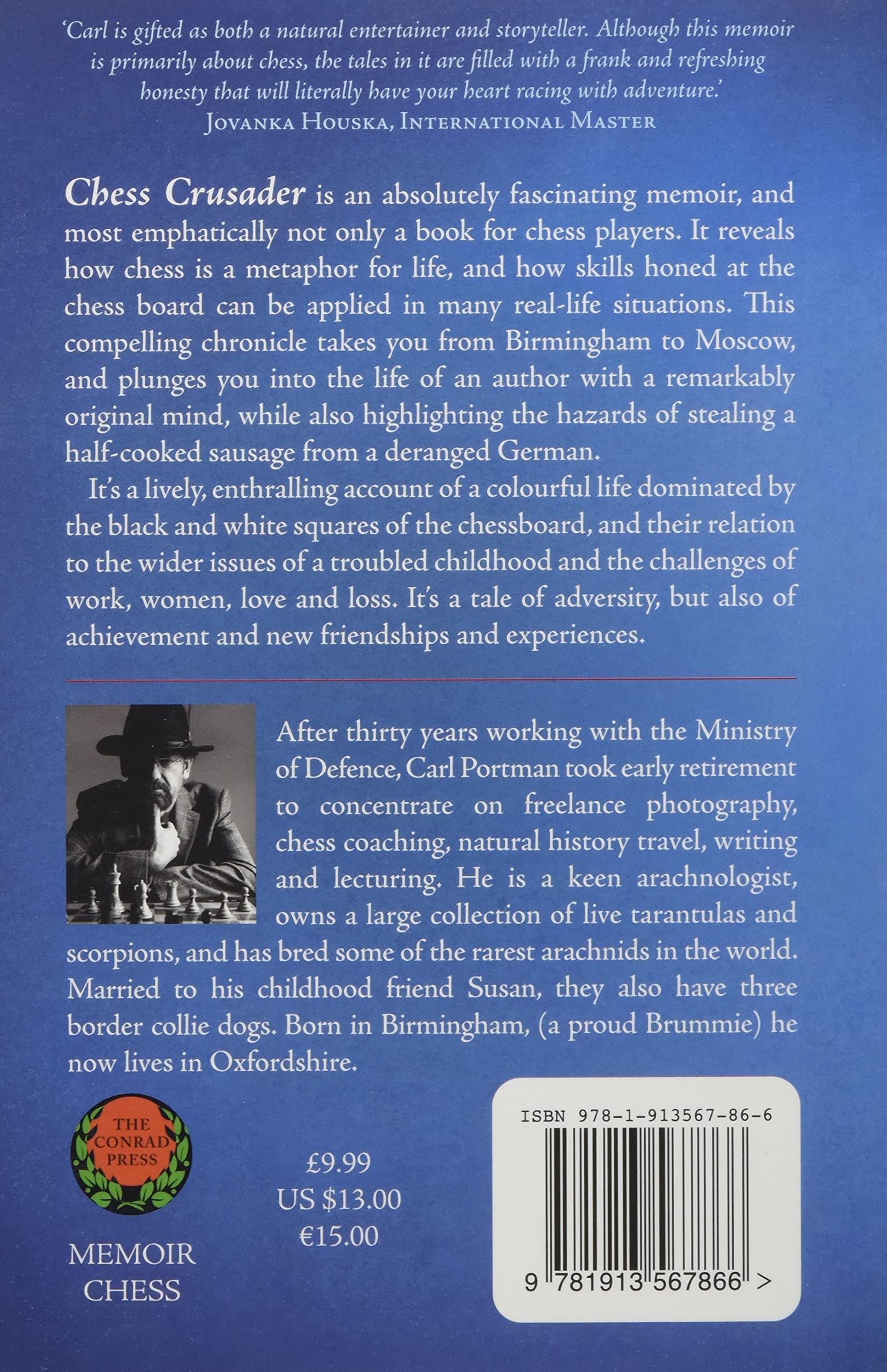
From the publisher’s blurb:
“Funny and brutal. A big-hearted book, I enjoyed it.’ Stuart Conquest, Grandmaster
‘Carl is gifted as both a natural entertainer and storyteller. Although this memoir is primarily about chess, the tales in it are filled with a frank and refreshing honesty that will literally have your heart racing with adventure.’ Jovanka Houska, International Master
Chess Crusader is an absolutely fascinating memoir, and most emphatically not only a book for chess players.
It reveals how chess is a metaphor for life, and how skills honed at the chess board can be applied in many real-life situations. This compelling chronicle takes you from Birmingham to Moscow, and plunges you into the life of an author with a remarkable original mind, while also highlighting the hazards of stealing a half-cooked sausage from a deranged German.
It’s a lively, enthralling account of a colourful life dominated by the black and white squares of the chessboard, and their relation to the wider issues of a troubled childhood and the challenges of work, women, love and loss. It’s a tale of adversity, but also of achievement and new friendships and experiences.”
After 30 years working with the Ministry of Defence, Carl Portman took early retirement to concentrate on freelance photography, chess coaching, natural history travel, writing and lecturing. He is a keen arachnologist, owns a large collection of live tarantulas and scorpions, and has bred some of the rarest arachnids in the world. Married to his childhood friend Susan, they also have three border collie dogs. Born in Birmingham, (a proud Brummie) he now lives in Oxfordshire.

Before going further you might wish to Look Inside.
Carl Portman’s work promoting chess in prisons (if you haven’t read his previous book Chess Behind Bars you should certainly do so) makes him one of the most inspirational figures in British chess.
Now he offers us an autobiography in which his life in chess features prominently. Carl was born on a Birmingham council estate in 1964 and, when he was still very young, his father left home, never to return. When he was 12, his mother, an alcoholic, remarried. Her new husband was a psychopath who was physically, verbally and emotionally abusive to both Carl and his mother.
Carl didn’t come from a chess-playing background, and was introduced to chess by John Lenton, a teacher at his secondary school. He soon became obsessed with the game, as he tells us, eventually becoming school champion.
Chess would therefore be my mental opiate; the living embodiment of disappearing down the rabbit hole. I played it in class, on the bus, in exams, in the toilets, in the playground, the chess club and in my room at home.
It would be the one thing I could turn to when the horrors of home life [were] raging around me. What a gift this was, from nowhere. Chess would never let me down.
Carl takes us through his eventful life, from his abusive stepfather through two marriages, from his schooldays into his working life, most notably 30 years working in logistics for the Ministry of Defence, including several years in Germany. One of the highlighs of his chess career was captaining his country in the NATO team championships in 2017 and 2018. We learn about his other interests: football (he’s a passionate Aston Villa supporter), heavy metal music and nature. There are many hilarious anecdotes to entertain you. He also tells about his serious health problems and how he learnt to live with them.
One thing Carl enjoys is meeting his heroes: he relates stories of travelling to France to play in a simul against Karpov, and arranging tuition from Mickey Adams and Jovanka Houska, as well as playing chess against the astronomer Patrick Moore.
In his last chapter he sums up as follows:
In this book, I have openly shared my experiences about the wonder of finding chess in my formative years and how it has shaped and influenced my life. The people I have met and the places I have visited have been wonderfully life-enriching, and the mental nourishment that the game provides is so powerful that I cannot quantify it.
Carl’s determination to remain upbeat and optimistic, whatever life throws at him, can only be an example to us all.
If you want some chess, there’s a short games selection at the back. Carl is particularly proud of this game from the 2017 NATO championships. He had the worst of things for most of the game, but his opponent mistakenly transposed into a losing pawn ending. ‘Never give up’ is his motto both in chess and in life.
It may not be great literature but the book’s a great read which will be enjoyed by most chess players. As no knowledge of the game is necessary for most of it, it could also be an ideal last-minute Christmas present for that special non-player in your life who, you think, ought to learn more about the delights of your favourite game. Be warned, though, that it’s not really suitable for younger children, nor for your Great Aunt Edna who doesn’t like books with naughty words. Carl is never afraid to speak his mind, even if he makes enemies in the process, and if you’re, like me, a politically correct, woke liberal, you’ll find words and opinions which might make you uneasy. If they make you think as well it might not be a bad idea.
Personally, I could have done without pages 231 to 254, which describe various types of annoying chess player, a negative chapter, most of which we’ve all read many times before, in what is otherwise a positive book. Omitting that chapter would, for me, have made it an even stronger book than it is already.
Books of this nature should be supported, though, so, if you think you’ll enjoy it, do give it a try.
I also see this book as part of a trilogy comprising the other two books I’ve reviewed recently, all deeply and at times brutally personal and confessional books by English chess players who, just as I did, developed a chess obsession in their teens. David LeMoir is a master standard player born, like me, in 1950. Carl Portman is, like me, a fairly strong club player, born in 1964. Daniel Gormally is a grandmaster born in 1976. Three players very different players, with very different personalities and lives, born half a generation apart from each other, whose stories, when put together, tell you a lot about chess in England over the past half century. I, of course, have my story as well: a very different story again, but I haven’t as yet had the courage to tell it. Maybe one day.
I would also suggest that Carl has, over the years, both put more into chess and got more out of chess than many much higher rated players. Yet, with today’s obsession with prodigies and champions, young people, like Carl, and also, to an extent, like me, from non-academic, non-chess backgrounds are no longer attracted to the game. Promoting chess at secondary school level may not be an efficient way of finding grandmasters, but Carl is living proof that it can offer transformation, redemption and salvation. I’ll be writing much more about this over the next few months.
Richard James, Twickenham 20th December 2021

Book Details :
- Softcover: 352 pages
- Publisher: The Conrad Press (22 July 2021)
- Language: English
- ISBN-10:1913567869
- ISBN-13:978-1913567866
- Product Dimensions: 12.9 x 2.5 x 19.8 cm
Official web site of The Conrad Press


In my book it is great literature but I might have given it a different title like perhaps “The King’s Gambit”. Of course it makes some people uncomfortable but he says what he feels is true and that should not be censored. The section on “cheating” is memorable in how he deals with those situations and reflects on how he approaches life in general.